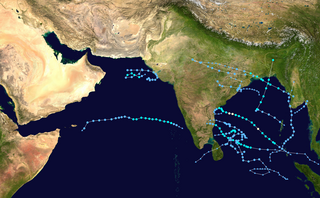Indian or Indians may refer to:

Tropical cyclone warnings and watches are alerts issued by national weather forecasting bodies to coastal areas threatened by the imminent approach of a tropical cyclone of tropical storm or hurricane intensity. They are notices to the local population and civil authorities to make appropriate preparation for the cyclone, including evacuation of vulnerable areas where necessary. It is important that interests throughout the area of an alert make preparations to protect life and property, and do not disregard it on the strength of the detailed forecast track.

The Joint Typhoon Warning Center (JTWC) is a joint United States Navy – United States Air Force command in Pearl Harbor, Hawaii. The JTWC is responsible for the issuing of tropical cyclone warnings in the North-West Pacific Ocean, South Pacific Ocean, and Indian Ocean for all branches of the U.S. Department of Defense and other U.S. government agencies. Their warnings are intended for the protection of primarily military ships and aircraft as well as military installations jointly operated with other countries around the world.
The name Dolly has been used for twelve tropical cyclones worldwide.
Atlantic Coast may refer to:

In the Indian Ocean north of the equator, tropical cyclones can form throughout the year on either side of India, although most frequently between April and June, and between October and December.
The name Alice has been used for eighteen tropical cyclones worldwide: four in the Atlantic Ocean, ten in the Western Pacific Ocean, one in the South-West Indian Ocean, and three in the Australian region.

Tropical cyclones are ranked on one of five tropical cyclone intensity scales, according to their maximum sustained winds and which tropical cyclone basin(s) they are located in. Only a few scales of classifications are used officially by the meteorological agencies monitoring the tropical cyclones, but other scales also exist, such as accumulated cyclone energy, the Power Dissipation Index, the Integrated Kinetic Energy Index, and the Hurricane Severity Index.
Yas is an Iranian rapper.

A tropical cyclone is a rapidly rotating storm system characterized by a low-pressure center, a closed low-level atmospheric circulation, strong winds, and a spiral arrangement of thunderstorms that produce heavy rain and/or squalls. Depending on its location and strength, a tropical cyclone is referred to by different names, including hurricane, typhoon, tropical storm, cyclonic storm, tropical depression, or simply cyclone: A hurricane is a strong tropical cyclone that occurs in the Atlantic Ocean or northeastern Pacific Ocean, and a typhoon occurs in the northwestern Pacific Ocean; in the Indian Ocean, south Pacific, or (rarely) South Atlantic, comparable storms are referred to simply as "tropical cyclones", and such storms in the Indian Ocean can also be called "severe cyclonic storms".

A Regional Specialized Meteorological Centre (RSMC) is responsible for the distribution of information, advisories, and warnings regarding the specific program they have a part of, agreed by consensus at the World Meteorological Organization as part of the World Weather Watch.

Traditionally, areas of tropical cyclone formation are divided into seven basins. These include the north Atlantic Ocean, the eastern and western parts of the northern Pacific Ocean, the southwestern Pacific, the southwestern and southeastern Indian Oceans, and the northern Indian Ocean. The western Pacific is the most active and the north Indian the least active. An average of 86 tropical cyclones of tropical storm intensity form annually worldwide, with 47 reaching hurricane/typhoon strength, and 20 becoming intense tropical cyclones, super typhoons, or major hurricanes.
The name Andrea has been used for two tropical cyclones and two subtropical cyclones worldwide.

In the south-west Indian Ocean, tropical cyclones form south of the equator and west of 90° E to the coast of Africa.

The 2022 North Indian Ocean cyclone season is an ongoing event in the annual cycle of tropical cyclone formation. The North Indian Ocean cyclone season has no official bounds, but cyclones tend to form between April and December, with the peak from May to November. These dates conventionally delimit the period of each year when most tropical cyclones form in the northern Indian Ocean.
The following is a list of tropical cyclones by year. Since the year 957, there have been at least 12,791 recorded tropical or subtropical cyclones in the Atlantic, Pacific, and Indian Oceans, which are known as basins. Collectively, tropical cyclones caused more than US$1.2 trillion in damage, unadjusted for inflation, and have killed more than 2.6 million people. Most of these deaths were caused by a few deadly cyclones, including the 1881 Haiphong typhoon, the 1931 Shanghai typhoon, the 1970 Bhola cyclone, Typhoon Nina in 1975, the 1991 Bangladesh cyclone, and Cyclone Nargis in 2008.
This page is based on this
Wikipedia article Text is available under the
CC BY-SA 4.0 license; additional terms may apply.
Images, videos and audio are available under their respective licenses.





